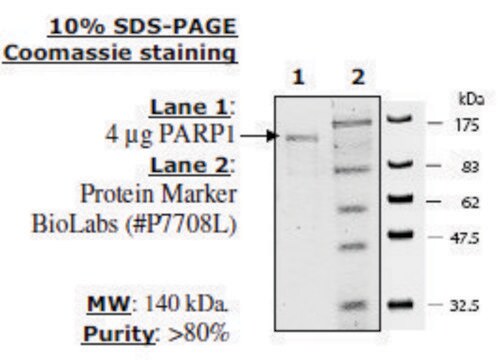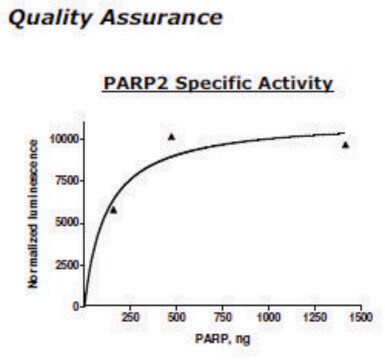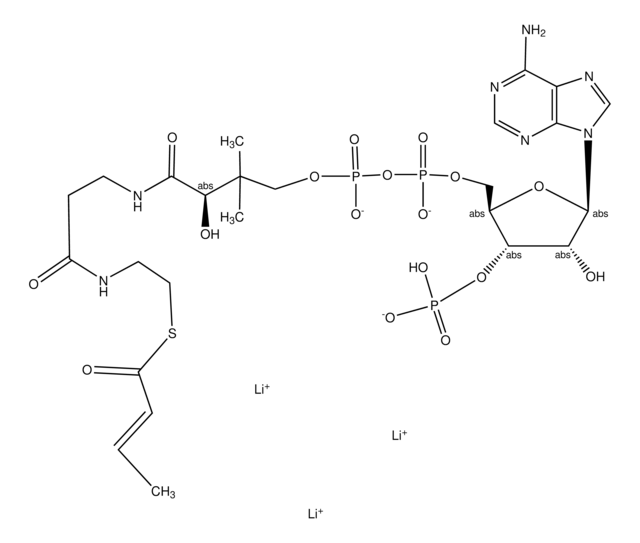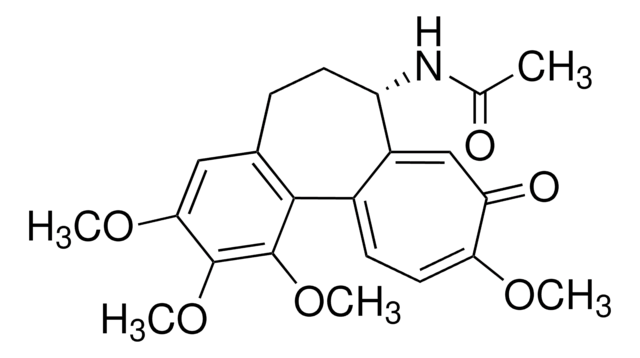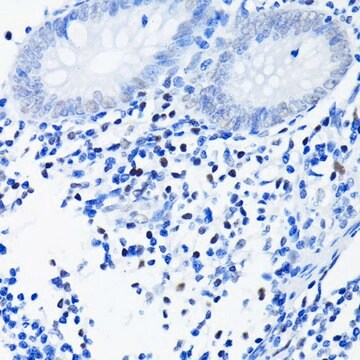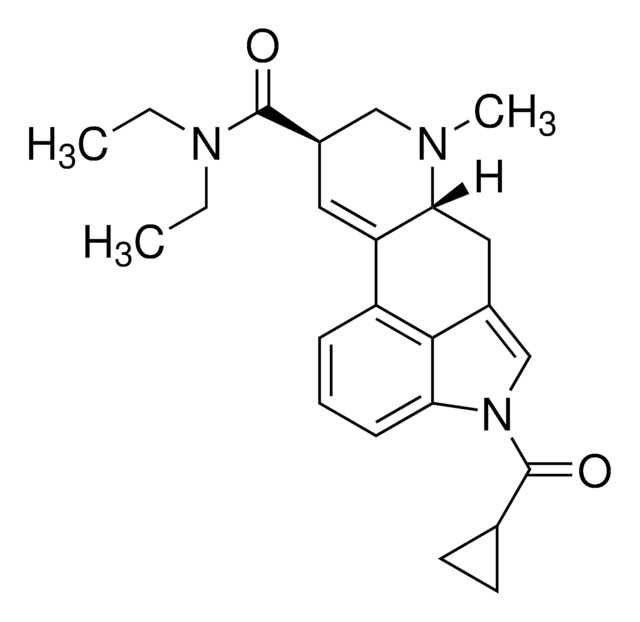P0996
PARP-1 human
recombinant, expressed in E. coli
Sinonimo/i:
NAD+ ADP-ribosyltransferase, Poly(ADP-ribose) Polymerase
Autenticatiper visualizzare i prezzi riservati alla tua organizzazione & contrattuali
About This Item
Numero MDL:
Codice UNSPSC:
12352204
NACRES:
NA.54
Prodotti consigliati
Ricombinante
expressed in E. coli
Forma fisica
solution
N° accesso UniProt
Condizioni di spedizione
wet ice
Temperatura di conservazione
−20°C
Informazioni sul gene
human ... PARP1(142)
Cerchi prodotti simili? Visita Guida al confronto tra prodotti
Descrizione generale
Poly(ADP-ribose) polymerase 1 (PARP-1) is associated with the inflammation response during atherosclerosis.
Poly(ADP-ribose) polymerase 1 (PARP1) belongs to the PARP family which is highly conserved during evolution. PARP1 gene is localized at 1q42.12 in the human chromosome.
Applicazioni
PARP-1 human has been used in the GST-pull down assay for immunoprecipitation of Glutathione S-transferase (GST) or GST- cyclic GMP- AMP synthase (cGAS) (GST-cGAS). It has also been used in in vitro ribosylation assay.
PARP-1 is a nuclear enzyme that synthesizes ADP-ribose polymers from NAD+, specifically binds Zn2+ and DNA, and recognizes single-strand breaks in DNA. PARP1 has been used in a study to assess racial and tissue-specific cancer risk associated with polymorphism in the PARP1 gene. It has also been used in a study to investigate inhibitors of PARP-1 for potential cancer treatments.
Azioni biochim/fisiol
PARP-1 is inactivated by cleavage into a 24kDA and 89kDA fragment by activated caspase-3 or caspase-7. This results in the decreased ability to repair DNA damage and an increase in apoptosis.
PARP-1, a nuclear enzyme that synthesizes ADP-ribose polymers from NAD, specifically binds Zn2+ and DNA, and recognizes single-strand breaks in DNA. It is involved in base excision repair, both short-patch and long-patch, rejoining DNA strand breaks and plays a role in p53 expression and activation. A high level of basal neuronal DNA damage and PARP activity has been reported in rat brain tissue. PARP-1 was shown to be required for HIV-1 integration into DNA. If PARP-1 is deficient there is no productive HIV-1 infection.
Poly(ADP-ribose) polymerase 1 (PARP1) is essential for diverse functions like DNA damage detection and repair, chromatin modification, cell differentiation, transcription and apoptotic cell death. It also plays a major role in spermatogenesis. Polymorphism in the gene PARP1 is associated with oligospermia and causes male infertility.
Definizione di unità
One unit will incorporate 10 femptomole of poly(ADP-ribose) from NAD into 5 μg of immobilized histone proteins in 30 minutes at 22 °C in a 96 well plate.
Stato fisico
Supplied as a solution in 20 mM Tris-HCl, pH 8.0, 200 mM NaCl, 1 mM DTT, 0.1% Triton™-X 100, 50 % glycerol, and 0.1 mg/ml BSA.
Note legali
Triton is a trademark of The Dow Chemical Company or an affiliated company of Dow
Codice della classe di stoccaggio
10 - Combustible liquids
Classe di pericolosità dell'acqua (WGK)
WGK 2
Punto d’infiammabilità (°F)
Not applicable
Punto d’infiammabilità (°C)
Not applicable
Certificati d'analisi (COA)
Cerca il Certificati d'analisi (COA) digitando il numero di lotto/batch corrispondente. I numeri di lotto o di batch sono stampati sull'etichetta dei prodotti dopo la parola ‘Lotto’ o ‘Batch’.
Possiedi già questo prodotto?
I documenti relativi ai prodotti acquistati recentemente sono disponibili nell’Archivio dei documenti.
Nuclear cGAS suppresses DNA repair and promotes tumorigenesis
Liu H, et al.
Nature, 563(7729), 131-131 (2018)
S Muller et al.
Clinical immunology and immunopathology, 73(2), 187-196 (1994-11-01)
Poly(ADP-Ribose) polymerase (PARP) is a chromatin-associated enzyme that specifically binds to DNA strand breaks in a zinc-dependent manner. We describe here the presence of IgG antibodies reacting with recombinant human PARP in the serum of patients with systemic lupus erythematosus
PARP cleavage as a means of assessing apoptosis.
Peter Mullen
Methods in molecular medicine, 88, 171-181 (2003-11-25)
David Davidson et al.
Investigational new drugs, 31(2), 461-468 (2012-10-12)
Poly [ADP-ribose] polymerase-1 (PARP-1) localizes rapidly to sites of DNA damage and has been associated with various repair mechanisms including base excision repair (BER) and homologous recombination/non-homologous end joining (HRR/NHEJ). PARP-1 acts by adding poly-ADP ribose side chains to target
S Smith et al.
Science (New York, N.Y.), 282(5393), 1484-1487 (1998-11-20)
Tankyrase, a protein with homology to ankyrins and to the catalytic domain of poly(adenosine diphosphate-ribose) polymerase (PARP), was identified and localized to human telomeres. Tankyrase binds to the telomeric protein TRF1 (telomeric repeat binding factor-1), a negative regulator of telomere
Il team dei nostri ricercatori vanta grande esperienza in tutte le aree della ricerca quali Life Science, scienza dei materiali, sintesi chimica, cromatografia, discipline analitiche, ecc..
Contatta l'Assistenza Tecnica.